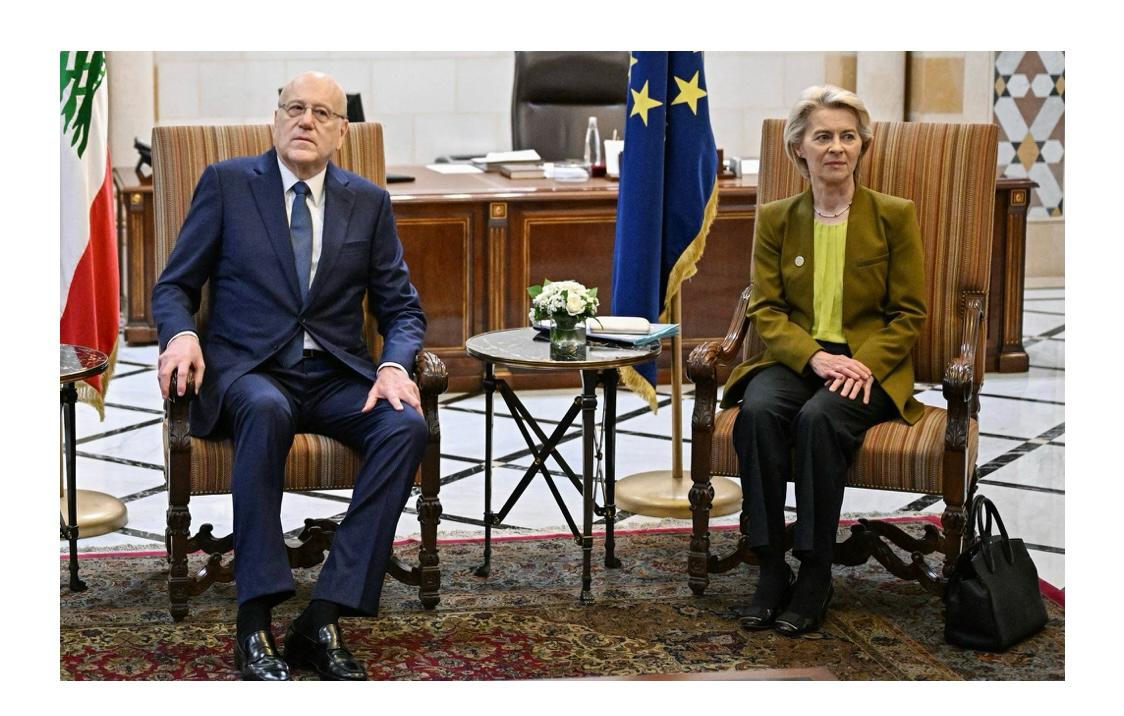Syrian refugees: for Beirut and Damascus a source of instability, the EU allocates funds
There is still deep disagreement between Lebanon and Brussels over the presence of more than two million people in the country without official documents. The country of the cedars demands their repatriation, while Europe only wants to avert migration to its shores, offering money in exchange. On the table is an aid plan for one billion euros over four years.
Beirut (AsiaNews) - The President of the EU Commission Ursula von der Leyen, on a visit to Lebanon, announced yesterday the granting to Lebanon of an aid program worth one billion euros to be allocated by 2027. The top European official he communicated this at the end of a meeting with the outgoing Prime Minister Nagib Mikati, the Cypriot President Nikos Christodoulidès and in the presence of several officials from the Land of Cedars. A meeting, institutional sources report, focused largely on the delicate and age-old issue of Syrian migrants.
The aid will mainly serve to support "the economic and social stability" of Lebanon, strengthening "fundamental structures" such as education, social security and healthcare. At the same time, aid will be provided within the framework of the Beirut-EU program for "the security forces and the army", in particular with the sending of equipment and through training, thanks to which it will be possible to "guard the borders".
This opinion is supported by a comment from the Cypriot president, who stated bluntly yesterday that the current situation "can no longer continue, neither for Cyprus nor for the European Union". Christodoulidès was alluding to the practice of rejection by the Nicosia coast guard of migrants who left the Lebanese coast.
May 27th in Brussels
It should be remembered here that President von der Leyen's visit precedes the Brussels conference on Syria, scheduled for May 27, an opportunity that Lebanon still without a head of state intends to seize to put pressure on repatriations.
Beirut's objective is to bring back to regions considered safe in Syria all the migrants who are currently in the country of the cedars without official documents, which excludes those who have work permits. At the same time, government leaders intend to be careful not to expel opponents, who risk being arrested by the Damascus intelligence services if they return home.
The European Union, for its part, still shows strong opposition to their return, in this case for reasons of political expediency although, at least officially, it claims to fear massive human rights violations by the regime of President Bashar al- Assad.
“However, even for Lebanon this situation can no longer continue” underlines MP Ziad Hawat, close to the Lebanese Forces. Citizens are now worried about the demographic growth of the Syrian refugee population, estimated at over two million people, equal to about a third of the total. These fears were rekindled in the aftermath of the murder of senior member of the Lebanese Forces Pascal Sleiman by a gang of Syrian car thieves.
This "crime too many" has led to attacks and beatings against Syrians, municipal restrictions (curfews, bans on gatherings), traffic blocks and the closure by neighborhood officials of shops opened without a license by Syrian immigrants.
Obstacles
In reality, the first obstacle to the repatriation of Syrians is Damascus' effective opposition to the return of migrants to its territory. In order to repatriate them, Bashar al-Assad needs to have an official interlocutor in front of him. In practice, he is trying to normalize relations with Lebanon, a process that deeply divides the inhabitants of the Land of Cedars and is at odds with the American sanctions imposed on Syria.
Furthermore, the Lebanese army, in the midst of the crisis, does not have the means to control the 280 kilometers of border it shares with its neighbor, much less in the current regional crisis situation and with the supporting war in Gaza launched by Hezbollah on 8 last October, without any prior consultation.
Moreover, Damascus subordinates the repatriations - which also concern the neighboring nations of Jordan and Turkey - to the allocation of economic aid for the reconstruction of all those areas destroyed by the war. Nonetheless, the international community categorically rejects this condition until the Syrian regime introduces democratic reforms, which the current Alawite leadership led by Bashar al-Assad refuses to do.
According to Fabrice Ballanche, professor at the University of Lyon II and expert on Syria quoted by his colleague Jeannine Jalkh of L'Orient-Le Jour (LOJ), Bashar al-Assad "does not want the vast majority of Syrian migrants to return, nor from Lebanon nor elsewhere. And he does so for a primary reason which is both political and pertaining to the community sphere: the return of seven million Sunni Arabs - he concludes - would upset the balance between minorities and Sunnis in the area he controls".
13/12/2023 16:03







.png)










